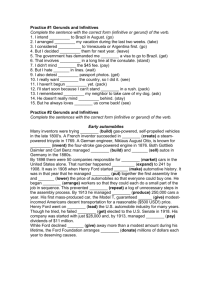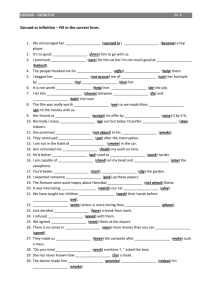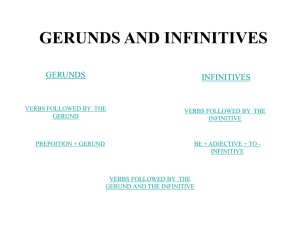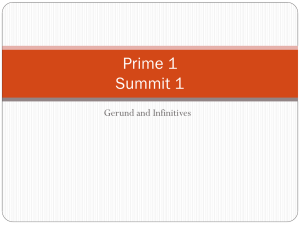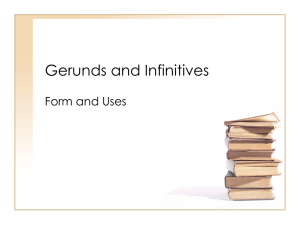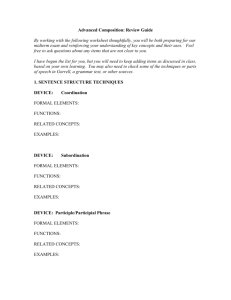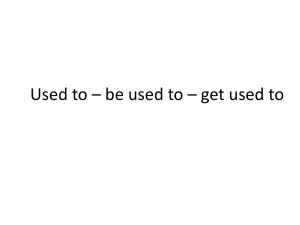Gerunds and Infinitives Some verbs can be followed by a gerund or
advertisement
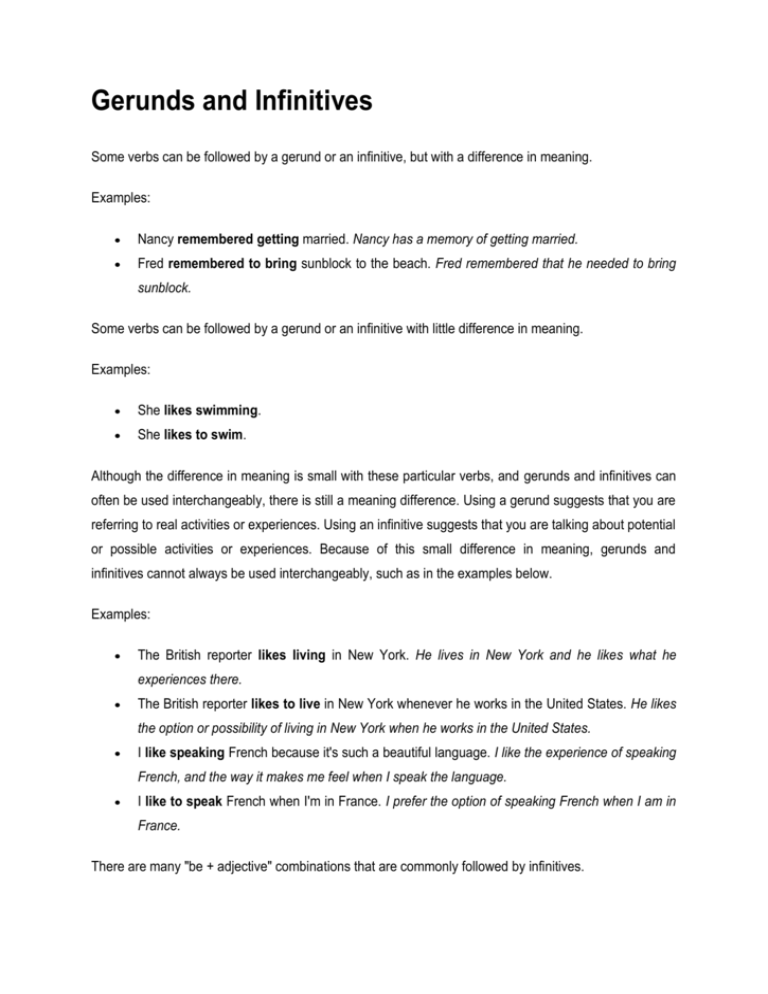
Gerunds and Infinitives Some verbs can be followed by a gerund or an infinitive, but with a difference in meaning. Examples: Nancy remembered getting married. Nancy has a memory of getting married. Fred remembered to bring sunblock to the beach. Fred remembered that he needed to bring sunblock. Some verbs can be followed by a gerund or an infinitive with little difference in meaning. Examples: She likes swimming. She likes to swim. Although the difference in meaning is small with these particular verbs, and gerunds and infinitives can often be used interchangeably, there is still a meaning difference. Using a gerund suggests that you are referring to real activities or experiences. Using an infinitive suggests that you are talking about potential or possible activities or experiences. Because of this small difference in meaning, gerunds and infinitives cannot always be used interchangeably, such as in the examples below. Examples: The British reporter likes living in New York. He lives in New York and he likes what he experiences there. The British reporter likes to live in New York whenever he works in the United States. He likes the option or possibility of living in New York when he works in the United States. I like speaking French because it's such a beautiful language. I like the experience of speaking French, and the way it makes me feel when I speak the language. I like to speak French when I'm in France. I prefer the option of speaking French when I am in France. There are many "be + adjective" combinations that are commonly followed by infinitives. Examples: They were anxious to begin. She was delighted to receive such good feedback. He is lucky to have such good friends. There are also many nouns that are commonly followed by infinitives. Examples: It was a good decision to move to San Francisco. His wish to become an actor was well known. Laura's desire to improve impressed me. Sometimes infinitives are used to express the idea of "in order to do something." Examples: He bought the English dictionary to look up difficult words. in order to look up Janine sold her car to get the money that she needed. in order to get Juan uses Englishpage.com to learn English. in order to learn This idea of "in order to do something" is found in many English patterns. too + adjective/adverb + infinitive Examples: The box is too heavy to carry. The television is too expensive to buy. Fiona ran too slowly to win the race. We arrived too late to see the beginning of the movie. adjective/adverb + enough + infinitive Examples: She is tall enough to reach the book on the shelf. Brian was smart enough to enter college at the age of 12. Linda runs quickly enough to win the race. enough + noun(s) + infinitive Examples: He has enough money to buy his own car. Cheryl owns enough books to start her own library! Diane needs enough time to finish writing her book. Certain expressions are followed by "ING" forms. Examples: He had fun fishing. They had difficulty finding a parking place. She spent her time practicing the piano. Verbs which indicate location can often be followed by "ING" forms. This pattern is VERB OF LOCATION + LOCATION + VERB+ING. Examples: Sarah stood at the corner waiting for Tom. Melissa lay in bed thinking about her future. Don clung to the side of the cliff looking down. In addition to simple gerund and infinitive forms, there are progressive gerund and infinitive forms, passive gerund and infinitive forms and perfect gerund and infinitive forms as well as combinations of these forms. Progressive forms are used to emphasize that an action is taking place now. Passive forms are used to emphasize that the subject of the sentence is being acted upon. Perfect gerund and infinitive forms are used to emphasize completion in both the past and the future. Study the examples below to help understand these concepts. GERUND FORMS INFINITIVE FORMS SIMPLE The teacher enjoys teaching. The teacher wants to teach. PROGRESSIVE Mr. Smith is really enjoying teaching his class. Looks the same as simple form above. Mr. Smith would like to be teaching his class. PASSIVE The students enjoy being taught. The students want to be taught. PERFECT The retired teacher recalled having taught. The teacher was expecting to have taught that already. PASSIVE PROGRESSIVE + The students are enjoying being taught by such an exciting new teacher. Looks the same as the passive form above. The students would like to be being taught by Mr Smith. PASSIVE PERFECT + The older students recalled having been taught that already. The students were expecting to have been taught that by now.

